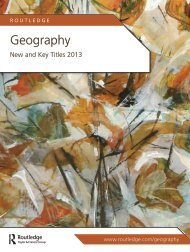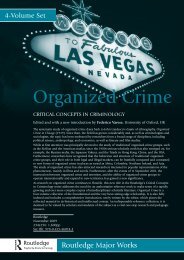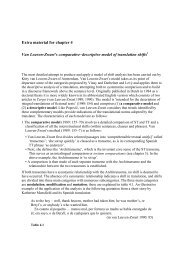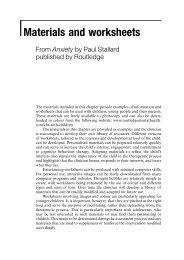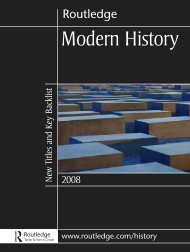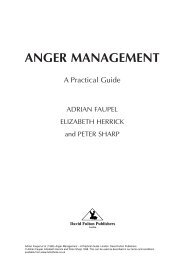Easily na - Routledge
Easily na - Routledge
Easily na - Routledge
You also want an ePaper? Increase the reach of your titles
YUMPU automatically turns print PDFs into web optimized ePapers that Google loves.
Understanding Terrorism<br />
and Political Violence<br />
The Life Cycle of Birth, Growth,<br />
Transformation, and Demise<br />
Dipak K. Gupta, San Diego State University, USA<br />
’Highly recommended’ – R.G.<br />
Mainuddin, Choice<br />
’Reading this book, it is clear<br />
that it is a labor of love. A<br />
combi<strong>na</strong>tion of perso<strong>na</strong>l<br />
detail (a terrific opening<br />
section that will surprise<br />
many familiar with his<br />
previous work), literary<br />
observations, crossdiscipli<strong>na</strong>ry<br />
references<br />
that never feel clumsily<br />
juxtaposed, and examples<br />
drawn from across conceptual boundaries provide<br />
the reader with a richly potent stew of material to<br />
contemplate. What Gupta ultimately provides in<br />
his dy<strong>na</strong>mic conceptual framework is a research<br />
agenda, rich for potential hypothesis testing.<br />
Gupta rises to the challenge laid down by Walter<br />
Reich and others in terrorism studies by moving<br />
beyond the confines of individual discipli<strong>na</strong>ry<br />
perspectives, and for that alone should be praised.<br />
That he does so by providing a thoughtful, learned<br />
volume is even more reason to read this important<br />
and essential book.’ – John Horgan, Pennsylvanian<br />
State University, USA<br />
Selected Contents: Foreword Martha Crenshaw.<br />
Introduction. Theories on Origins of Movements. Selfish<br />
Altruist: Modeling the Mind of a Terrorist. The Dy<strong>na</strong>mics of<br />
Dissent: A Theoretical Perspective. Faith, Natio<strong>na</strong>lism, and<br />
Class Warfare: Birth of a Movement. Growth of Rebellion.<br />
A Marriage Made in Hell? Terrorism and Organized Crime.<br />
Terrorism’s Trap: A Win<strong>na</strong>ble War? Appendix A. Appendix B<br />
2008: 234 x 156: 304pp<br />
Hb: 978-0-415-77164-1: £90.00<br />
Pb: 978-0-415-77165-8: £23.99<br />
eBook: 978-0-203-93027-4<br />
For more information, visit:<br />
www.routledge.com/9780415771658<br />
Forthcoming in 2011<br />
Irish Republican Terrorism<br />
and Politics<br />
A Comparative Study of the Official<br />
and the Provisio<strong>na</strong>l IRA<br />
Kacper Rekawek, Warsaw School of Social Sciences<br />
and Humanities, Poland<br />
This book examines the post-ceasefire evolutions and<br />
histories of the main Irish republican terrorist factions,<br />
and the interconnected character of politics and<br />
militarism within these.<br />
Selected Contents: 1. Introduction 2. The Official<br />
Republican Movement: Military Evolution 1972-92<br />
3. The Provisio<strong>na</strong>l Republican Movement: Military Evolution<br />
1994-2005 4. Thematic A<strong>na</strong>lysis of Official Republican and<br />
Provisio<strong>na</strong>l Republican Post-Ceasefire Militarism 5. The<br />
Official Republican Movement: Political Evolution 1972-92<br />
6. The Provisio<strong>na</strong>l Republican Movement: Political Evolution<br />
1994-2005 7. Thematic A<strong>na</strong>lysis of Official Republican and<br />
Provisio<strong>na</strong>l Republican Post-Ceasefire Politics 8. Conclusions.<br />
Bibliography<br />
April 2011: 234 x 156: 224pp<br />
Hb: 978-0-415-58801-0: £75.00<br />
For more information, visit:<br />
www.routledge.com/9780415588010<br />
Leaving Terrorism Behind<br />
Individual and Collective Disengagement<br />
Edited by Tore Bjorgo, Norwegian Institute of<br />
Inter<strong>na</strong>tio<strong>na</strong>l Affairs (NUPI), Oslo, Norway and<br />
John Horgan, Pennsylvania State University, USA<br />
While there has been a<br />
growing awareness of the<br />
need to understand and prevent<br />
processes of radicalization into<br />
terrorism, disengagement and<br />
deradicalization from terrorism<br />
have long been neglected areas<br />
in research on terrorism. This<br />
book uses empirical data to<br />
explore how and why individuals<br />
and groups disengage from<br />
terrorism, and what can be<br />
done to facilitate it.<br />
Selected Contents: Foreword 1. Introduction Tore Bjørgo<br />
and John Horgan Part 1: Processes 2. Individual<br />
Disengagement: A Psychological A<strong>na</strong>lysis John Horgan<br />
3. Processes of Disengagement from Violent Groups of the<br />
Extreme Right Tore Bjørgo 4. How Terrorist Campaigns End<br />
Audrey Kurth Cronin 5. Leaving Left-Wing Terrorism in Italy:<br />
A Sociological A<strong>na</strong>lysis Do<strong>na</strong>tella della Porta 6. Leaving<br />
Terrorism Behind in Northern Ireland and the Basque Country:<br />
Reassessing Anti-Terrorist Policies and the ’Peace Processes’<br />
Rogelio Alonso 7. The Renunciation of Violence by Egyptian<br />
Jihadi Organisations Diaa Rashwan Part 2: Programmes<br />
8. Exit from Right-Wing Extremist Groups: Lessons from<br />
Disengagement Programmes in Norway, Sweden and Germany<br />
Tore Bjørgo, Sara Grunenberg and Jaap van Donselaar<br />
9. Disengagement and Beyond: A Case Study of Demobilization<br />
in Colombia Marcella Ribetti 10. De-Radicalisation and<br />
Rehabilitation Programmes Targeting Militant Jihadists:<br />
An Overview Richard Barrett and Laila Bokhari 11. Opening<br />
up the Jihadi Debate: Yemen’s Committee for Dialogue<br />
Christopher Boucek, Shazadi Beg, and John Horgan 12. The<br />
Rehabilitation of Jemaah Islamiyah Detainees in Southeast<br />
Asia: A Prelimi<strong>na</strong>ry Assessment Zachary Abuza 13. Extremist<br />
Reeducation and Rehabilitation in Saudi Arabia Christopher<br />
Boucek 14. Pakistan: In Search of a Disengagement Strategy<br />
Shazadi Beg and Laila Bokhari Part 3: Conclusions<br />
15. Conclusions Tore Bjørgo and John Horgan<br />
2008: 234 x 156: 328pp<br />
Hb: 978-0-415-77667-7: £90.00<br />
Pb: 978-0-415-77668-4: £23.99<br />
eBook: 978-0-203-88475-1<br />
For more information, visit:<br />
www.routledge.com/9780415776684<br />
Browse and order online: www.routledge.com/securitystudies<br />
TerrorisM sTudies 45<br />
Forthcoming in 2011<br />
Conducting Terrorism<br />
Field Research<br />
A Guide<br />
Edited by Adam Dolnik, University of Wollongong,<br />
Australia<br />
Series: Contemporary Terrorism Studies<br />
This book offers a detailed and practically oriented guide<br />
to the challenges of conducting terrorist fieldwork.<br />
The past decade has seen an explosion of research into<br />
terrorism. However, while there is an increasing interest<br />
among terrorism specialists in conducting such research,<br />
there is no single volume providing prospective field<br />
researchers with a guideline to such work.<br />
This edited volume aims to fill this gap and offers<br />
a collection of articles from experienced authors<br />
representing different risk groups, disciplines,<br />
methodological approaches, regio<strong>na</strong>l specializations,<br />
and other context-specific aspects. Each contributor<br />
provides a road-map to their own research, describing<br />
planning and preparation phases, the formalities<br />
involved in getting into conflict zones, gaining access to<br />
sources, ma<strong>na</strong>ging contacts, interviewing militants in the<br />
field, detailed discussion on the risks involved, ethical<br />
dilemmas, translation issues, effective interviewing and<br />
rapport-building steps, and other practical aspects of<br />
conducting field research. The text will also help<br />
researchers set realistic expectations of how the process<br />
of interviewing militants and secretive government<br />
sources in conflict zones is organized, what the likely<br />
outcomes are, and assist with many other practical issues<br />
such as how to <strong>na</strong>vigate through challenges posed by<br />
government forces unsympathetic to researchers, how<br />
to reduce risk of physical harm when travelling in conflict<br />
zones, how to behave at hostile checkpoints, how to<br />
answer specific questions militants tend to ask prior and<br />
during interviews. The end product is a ’how to’ guide<br />
to field research on terrorism, which will be of much<br />
value to terrorism experts and novices alike, providing<br />
detailed insights into the challenges and obstacles in<br />
doing field research on terrorism, as well as advice on<br />
how these can be overcome.<br />
This book will be of much interest to students and<br />
researchers of terrorism studies, war and conflict studies,<br />
criminology, IR and security studies.<br />
Selected Contents: Introduction Adam Dolnik 1. The<br />
Need for Field Research on Terrorism Adam Dolnik 2. A<br />
More Accessible Population?: Interviewing Former Terrorists<br />
John Horgan 3. Field Research on Counterterrorism:<br />
Interviewing Government Sources Brian Jackson and Lindsey<br />
Clutterbuck 4. Interviewing al Qaida Jason Burke and Peter<br />
Bergen 5. The Participant Observer Method Keith Akins and<br />
Gerard Chaliand 6. The Use of Surveys in Field Research<br />
on Terrorism Christine Fair 7. Field Research on Terrorism<br />
in Colombia Michael Kenney 8. Field Research on Terrorism<br />
in Africa Anneli Botha 9. Field Research on Terrorism in<br />
Southeast Asia 10. Researching Terrorism in Pakistan: An<br />
Insider’s Perspective Amir Ra<strong>na</strong> 11. Interviewing Islamist<br />
Militants as a Woman 12. How to Research ’Us’?: A<br />
Terrorists’ Perspective Conclusions: Researching Terrorism<br />
in the Field: A ’How To’ Guide Adam Dolnik<br />
April 2011: 234 x 156: 240pp<br />
Hb: 978-0-415-60930-2: £85.00<br />
Pb: 978-0-415-60931-9: £23.99<br />
For more information, visit:<br />
www.routledge.com/9780415609319



